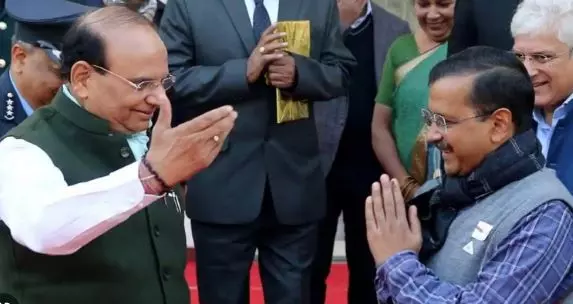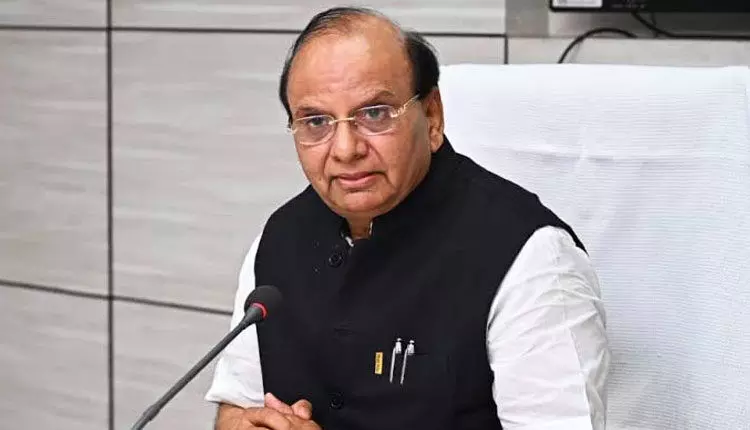
When Centre nullifies Supreme Court's decision
text_fieldsThe central government's Delhi Ordinance on May 19 has created a fresh dilemma for the Delhi administration by cancelling the Supreme Court's ruling of May 11, regarding the governance of Delhi, the national capital. The sum and substance of the Ordinance is that civil service officers working under the Government of the National Capital Territory of Delhi will not be bound to follow the orders issued by the elected Ministers, because they are answerable to the authority of the Lieutenant Governor (LG), the Centre's representative. This implies that none of the elected government's objectives will be fully fulfilled by the officials; officials chosen by ministers may not continue there; LG can relocate them, because public servants are accountable to LG and LG is not obligated to carry out every cabinet decision.
The debate over whether the Central government or the elected state government of Delhi is the sovereign in Delhi administration is not new. The state gained rights similar to non-Delhi states with the 69th Amendment to the Constitution in 1991, but for three areas; the powers of public order, police, and land were excluded. However, following the election to power of the Aam Aadmi Party, in 2012 the Centre made the first attempt to modify this by an order in 2015. As a result, the Lt. Governor was given sovereign authority over government service matters. They had no choice but to adopt the Chief Minister's suggestion at their own discretion. When the Delhi High Court affirmed this in 2016, the Delhi government appealed to the Supreme Court. The Supreme Court then declared in 2018 that the lieutenant governor must accept the chief minister's recommendations and has no authority to make decisions on his own. However, the decision on jurisdiction in service matters was delegated to another Bench which delivered a split verdict. And eventually it was assigned to a full constitutional bench. Its decision on May 11, restored the Delhi administration's authority. However, on May 19, the Centre, determined to have its way, issued a new legislation by ordinance superseding the court verdict. The Aam Aadmi Party's primary criticism is that it is making bureaucrats desired by Kejriwal unavailable to implement the government's policies and decisions, and is utilising the Lieutenant Governor (LG) to dissolve related decisions.
The new Ordinance demonstrates that the BJP will go to any length to eliminate the Kejriwal administration's popularly acclaimed welfare schemes with the full cooperation of the bureaucrats and to place all decisions under the control of their appointed LG, although the language of the ordinance's objectives wraps the motives in generalised verbiage. According to the Ordinance, when appointments and transfers are determined by a committee comprising the Services Secretary, Chief Secretary, and LG, the elected government is kept in the dark. The decree leaves no room for the government to penalise defaulting officials. For the last year and a half, government spokesmen, complain most of the key government agencies have been unable to fill any vacancies. The selection board is in total inertia. Many energetic and dedicated officers were moved as punishment. Officials are unsure whether they should obey the elected democratic government or the Lt. Governor., going by technicality. Many people do not even respond to the questions posed during the assembly. Officials are hesitant to attend meetings called by ministers. As a result, people are affected in essential areas such as medical service, sewage treatment projects, and infrastructure maintenance. Despite this, Law Minister Kailas Gahlot claims that things are moving along well solely because of the government's will power and devotion of some functionaries. The officers who had begun to demonstrate enthusiasm in their job with the May 11 judgement, seem to have lost steam with the new Ordinance. When the officers selected by the LG make up a majority, the elected Chief Minister is virtually vetoed. Even though the Delhi government vows that it would overcome all of this on its own and implement social programmes, the goal of the Centre is patently to crush non-BJP administration in Delhi too as done in the states through governors. The Centre's appeal on the May 11 court ruling is to come up before the Supreme Court, and the Delhi government is also sure to take the ordinance to court. Only if the AAP is successful can the country can have hope for the survival of federalism and the reflection of people's will in governance, at least in Delhi.

























